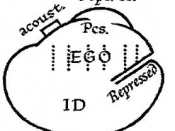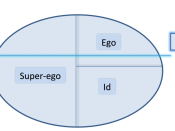A Freudian interpretation of William Golding's Lord of the Flies might see Piggy, Ralph, and Jack as the competing demands of the super-ego, the ego and the id respectively. If so, what view of human nature does Golding present in his novel?
William Golding's novel Lord of the Flies is a story of schoolboys being dropped onto an island from their home of England, without any adults or any sign of life beside themselves. A Freudian interpretation of the main characters might paint Piggy to be the mind of the super-ego, Ralph as the mind of the ego, and Jack as the id. This translation of the boys' core psychological states shows that Golding's view of human nature ranges from faith to a pessimistic sentiment of humanity.
A Freudian analysis of the characters in Lord of the Flies would have Piggy depicted as the mind of the super-ego.
Piggy has always relied on his aunt from when his parents died to his asthma, and this is evident to us in the first pages of the book. "My auntie told me not to run," he explained "on account of my asthma."(13). He has grown up in a sheltered world and as a reflex he goes back to what he has always known, rules and stability. He tries to establish a balanced environment where there are rules and a leader, as that is all that he has always known. As the novel progresses, we see Piggy clinging to the symbol of peace and power, the conch, in attempts to restore a sense of harmony between the two groups. The super-ego mindset that he is in forces him to do so, as he has no ability to turn to a primitive state of mind. The character of Piggy represents both Golding's...


